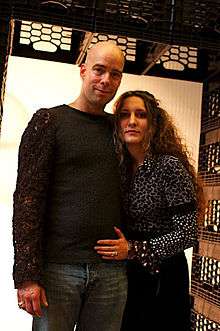Praxis (art collaborative)
| Praxis | |
|---|---|
 Carey and Bajo at the Whitney Museum, 2014 | |
| Born |
October 7, 1968 (Brainard Carey) November 2, 1974 (Delia Bajo) United States (Brainard Carey) Spain (Delia Bajo) |
| Known for | Conceptual Art / Artist Collaborative |
| Website |
museumofnonvisibleart |
Praxis is an art collaborative composed of a husband and wife team. Brainard Carey (born October 7, 1968) is an American, Delia Bajo (born November 2, 1974) is a Spaniard.[1] They live and work in New York City and New Haven, CT.
History
Praxis was formed in 1999. They had their first major exhibition in The Whitney Biennial in 2002 and they were reviewed by the critic and philosopher Arthur Danto for The Nation.[2]
 Whitney Museum of American Art, 2002, Praxis. Photo courtesy of Praxis
Whitney Museum of American Art, 2002, Praxis. Photo courtesy of Praxis Whitney Museum of American Art, 2002, Praxis. Photo courtesy of Praxis
Whitney Museum of American Art, 2002, Praxis. Photo courtesy of Praxis Whitney Museum of American Art, 2002, Praxis. Photo courtesy of Praxis
Whitney Museum of American Art, 2002, Praxis. Photo courtesy of Praxis
As Debra Singer said in the Whitney Biennial catalog that year, "as part of an ongoing performance project, this two-person collaborative team offers gallery visitors a menu of four free services: foot washes, hugs, Band-Aid applications to help heal visible or non-visible wounds, and gifts of dollar bills. Their interactive, nurturing performances offer alternative modes of economic and social exchange that serve as a comforting antidote to the potentially alienating effects of a world often dominated by technology and consumerism."[1]
Theatrical work
Praxis continued making interactive work and in 2005 was commissioned to create a theatrical work for artistic director Vallejo Gantner for his first show at Performance Space 122 in New York City.[1][3]
 Praxis in Forget Me Not at Performance Space 122. Photograph by Melanie Einzig
Praxis in Forget Me Not at Performance Space 122. Photograph by Melanie Einzig Praxis in Forget Me Not at Performance Space 122. Photograph by Melanie Einzig
Praxis in Forget Me Not at Performance Space 122. Photograph by Melanie Einzig
Solo show at Whitney Museum
In 2007, they had a solo show at the Whitney Museum of American Art curated and commissioned by Shamim Momin.[4][5]
Controversial conceptual museum project
They produced numerous projects and artworks in between major shows, and in 2011 they launched their Museum of Non-Visible Art on Kickstarter with James Franco as a collaborator.[6]
 Museum of Non-visible Art, Installation in Harlem, NY
Museum of Non-visible Art, Installation in Harlem, NY
The project was successful and drew international press including James Franco discussing the project on Jimmy Kimmel Live. The reaction from the art community and the general public was mixed. In various press and blog pieces the project was celebrated as a powerful project in the art world and also raised many questions about what art actually is, and why it becomes valuable. The Museum continues to this day and is currently looking for an architect to design the space. There is an international competition created by Praxis for a winning architect.
Publications
Currently Praxis (Brainard Carey and Delia Bajo, also known as Delia Carey) are writing books and developing their museum of non-visible art. They have written two books published by Skyhorse in New York City, The Art of Hugging[7] and The School of Wishing.[8]
See also
References
- 1 2 3 Valerie Gladstone (September 4, 2005). "Directions: The Naked and the Dead". The New York Times. Retrieved 2015-03-17.
- ↑ Arthur Danto. "The Show They Love to Hate". The Nation (April 29, 2002). Retrieved 2015-03-17.
- ↑ Roslyn Sulcas (September 10, 2005). "Performance Art Review – Praxis: Disconcerting Intimacy, With Hugs and Band-Aids". The New York Times. Retrieved 2015-03-17.
- ↑ "Performance on 42nd presents Praxis Studio: Dreams and Possibilities, a Whitney Live Commission" (PDF). Whitney Museum of American Art. Retrieved 2015-03-17. Press release for installation and performance open March 12–22, 2007. Copy at twobodies.com.
- ↑ Leah Oates. "Performance and Dreams". NY Arts (nyartsmagazine.com). Retrieved 2015-03-17. Interview.
- ↑ "Museum of Non-Visible Art – Praxis & James Franco collaborate by Brainard and Delia Carey". Kickstarter (kickstarter.com). Retrieved 2015-03-17.
- ↑ "The Art of Hugging: A Heartwarming Guide to Everyone's Favorite Gesture of Love (Paperback) by Brainard and Delia Carey". Amazon.com. Retrieved 2015-06-09.
More product data: Skyhorse Publishing; 1st ed.; June 5, 2012; ISBN 978-1-6160-8714-2; 208 pp. - ↑ "School of Wishing: Lessons to Change Your Life and Make Your Dreams Come True (Paperback) by Brainard and Delia Carey". Amazon.com. Retrieved 2015-06-09.
More product data: Skyhorse Publishing; 1st ed.; November 6, 2013; ISBN 978-1-6263-6115-7; 192 pp.
External links
- Official website
- Works by or about Praxis in libraries (WorldCat catalog)
- Works by or about Brainard Carey, Delia Carey, and Delia Bajo at WorldCat
- The Non-Visible Museum by Praxis on TV with James Franco at YouTube (video; upload Aug 4, 2011)
- Slovenian Television Clip of Biennial performance by Praxis at YouTube (video; upload Dec 1, 2011)